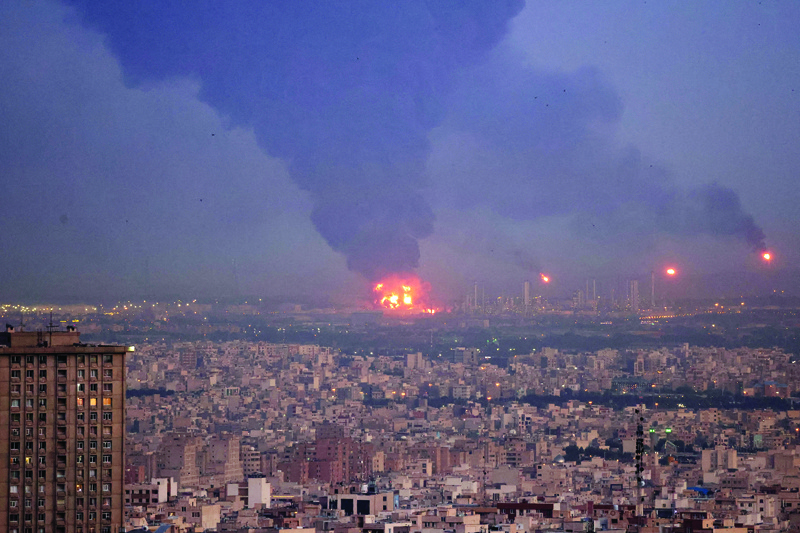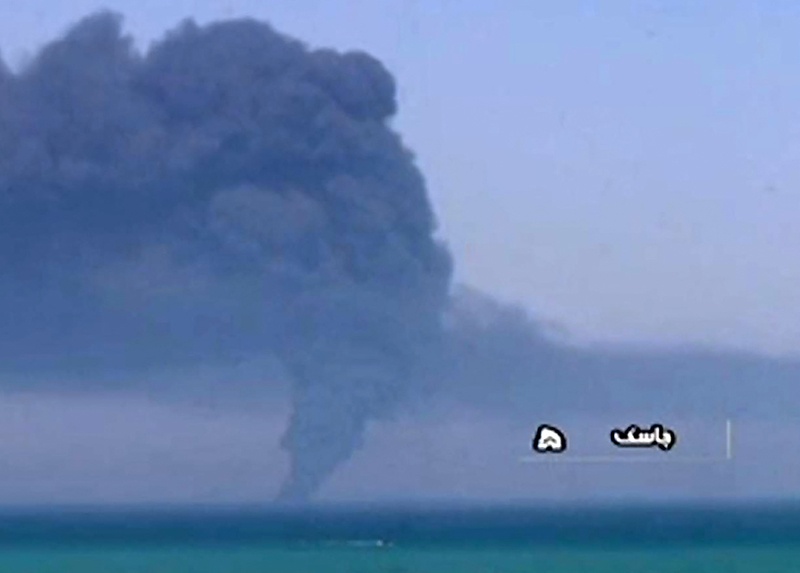 Smoke billows from the site of a refinery fire in Tehran yesterday. - AFP
Smoke billows from the site of a refinery fire in Tehran yesterday. - AFPTEHRAN: One of Iran's largest naval ships sank yesterday after catching fire while on a "training mission" off a strategic port near the head of the Gulf, the navy said. Later yesterday, a fierce blaze broke out at a refinery in southern Tehran after a liquefied gas line leaked and exploded, the head of the capital's crisis team said on state television. More than an hour after the blaze started, leaping flames and thick clouds of black smoke could be seen reaching high into the sky from far across Tehran.
The British-built fleet replenishment vessel Kharg, which was more than 200 m long, caught fire on Tuesday off the port of Jask on the Gulf of Oman, the navy said. Footage aired by state television showed a massive column of smoke rising from what it said was the burning vessel. The fire broke out in "one of the systems" of the ship, a navy statement said without elaborating. Firefighting efforts continued "for 20 hours" before the ship went down.
"Considering the spread of the fire, the mission to save the Kharg failed and it sank in waters off Jask," the navy said. The ship caught fire at 11 am on Tuesday as it was in "domestic waters" during "a training mission", Iran's Tasnim news agency quoted the navy's head of public relations Behzad Jahanian as saying.
 Image grab taken yesterday shows smoke billowing from the Iranian Kharg supply navy ship in the Gulf of Oman.
Image grab taken yesterday shows smoke billowing from the Iranian Kharg supply navy ship in the Gulf of Oman. It sank at around 8:30 am (0400 GMT) yesterday. All 400 cadets and crew disembarked safely, with 20 sustaining light injuries or burns. Jahanian said the cause of the fire was "still not clear". The vessel was ordered from Britain in 1976 when the pro-Western shah was still in power. It was not delivered until 1984 after years of wrangling between Britain and the government that took power after the Islamic revolution of 1979.
Jeremy Binnie of open-source defense intelligence provider Janes said the Kharg was important to Iran as its only dedicated vessel able to resupply warships at sea. "The Iranians often describe it as a 'helicopter carrier' but it is actually a replenishment ship - a useful asset nonetheless as it was the Islamic Republic of Iran Navy's only dedicated ship serving this role," Binnie said. "It is not the IRIN's largest vessel any more after they commissioned Makran, a converted oil tanker, in January," he added.
Iran's ISNA news agency said the vessel had left for a mission focused on "training, intelligence and combat" alongside the destroyer Alborz on May 19. The port city of Jask, near which the Kharg went down, lies close to the Strait of Hormuz, the strategic chokepoint at the head of the Gulf through which a fifth of world oil output passes.
Jask is strategically important to Iran as the government plans to make it the site of the country's second-largest oil export terminal. An approximately 1,000-km pipeline from Bushehr province on the Gulf to Jask was put into service a few days ago, the government said. It provides a new bypass route for Iranian oil exports that avoids the Strait of Hormuz.
Last year, an Iranian warship was hit by friendly fire during a naval exercise off Jask, killing the 19 sailors onboard. Logistical support vessel Konarak was hit after "moving a practice target to its destination and not creating enough distance between itself and the target," state television said at the time.
In recent months, there have also been reported attacks on Iran's shipping fleet that have been linked to its arch foe, the Zionist entity. In April, Tehran said its freighter Saviz was hit by an "explosion" in the Red Sea, after media reports said the Zionist entity had struck the ship. The New York Times reported at the time that the Saviz had been targeted in a Zionist "retaliatory" attack after "Iran's earlier strikes on (Zionist) ships". It came at a time of heightened tensions between the foes, with reports of a series of tit-for-tat attacks on shipping since early March.
Meanwhile, the refinery "accident was caused by a leak from an emergency liquefied gas line," triggering "an explosion which caused the start of the fire that we can observe," Tehran crisis team chief Mansour Darajati told state television. Darajati said that the fire had begun at around 7:30 pm local time (1500 GMT) and that there were "fortunately no deaths at this stage".
According to state news agency IRNA, the stricken refinery has been operational since 1968, has a capacity of 250,000 barrels per day and is owned by the Tehran Oil Refining Company. A spokesman for the company dismissed "all speculation centering on sabotage at the refinery", according to state television's Telegram channel. "The accident was caused by a technical problem and we are currently in the process of controlling the fire," he added. - AFP









